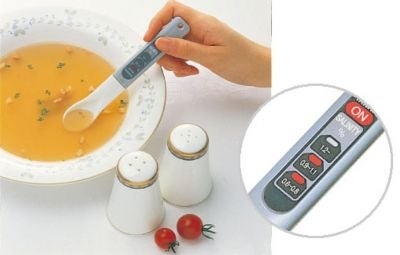New electronic spoon alerts you to too-salty soup

A new health product making waves this week is an electronic spoon from Japan's Compact Impact that tells you how much sodium is lurking in your soups and sauces.
Dubbed the Salinity Monitor Spoon, the spoon serves two purposes. "People who suffer from high blood pressure are often asked by their physicians to cut down on their sodium intake," wrote blogger Inventor Spot last Friday. "Trouble is, many elderly people have lost some degree of their sense of taste," so the spoon can provide an accurate measure as to whether or not your meal is brinier than the Dead Sea.
The Salinity Monitor Spoon is designed for hot soups, sauces, or other liquids ranging in temperature from 140 to 176 degrees F or 60 to 80 degrees C.
The spoon's indicators display three measures of sodium content: 0.6 - 0.8 percent, 0.9 - 1.1 percent, and a super-salty 1.2 percent and up. The numbers are large and in English. You can purchase one online at the Compact Impact website for $64.00.
For a cheaper price, digital salt meters - devices that resemble thermometers - can also be dipped into foods to measure salt intake in hot or cold food.
A few years back, US-based MIT developers designed a not-yet-on-the-market Intelligent Spoon, a tricked-out spoon featuring a thermometer, pH sensor, viscosity sensor, and salinity sensor, all designed to measure food data while you cook and eat. The spoon could be used to help you, say, blend just the right amount of acid and oil for the perfect salad dressing, as well as ensure you're not oversalting the stew.
Join our commenting forum
Join thought-provoking conversations, follow other Independent readers and see their replies
Comments
Bookmark popover
Removed from bookmarks